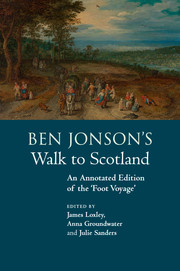Book contents
- Frontmatter
- Contents
- List of illustrations
- Acknowledgements
- A note on names
- Abbreviations
- Introduction: Jonson’s ‘Foot Voyage’ and the Aldersey manuscript
- My gossip Jonson his Foot Voyage and mine into Scotland
- Contextual essays
- 1 The genres of a walk
- 2 Jonson’s foot work
- 3 Scenes of hospitality
- Printed Works cited
- Index
3 - Scenes of hospitality
from Contextual essays
Published online by Cambridge University Press: 05 December 2014
- Frontmatter
- Contents
- List of illustrations
- Acknowledgements
- A note on names
- Abbreviations
- Introduction: Jonson’s ‘Foot Voyage’ and the Aldersey manuscript
- My gossip Jonson his Foot Voyage and mine into Scotland
- Contextual essays
- 1 The genres of a walk
- 2 Jonson’s foot work
- 3 Scenes of hospitality
- Printed Works cited
- Index
Summary
‘As if they came to entertain us…’
One of the most prominent features of the ‘Foot Voyage’ is the writer’s extraordinary effort to note the names and titles of the many people who hosted, escorted or encountered Jonson on the journey. While much of the other detail of the walk is abbreviated or omitted, this comprehensive enumerative effort reaches across the social spectrum, from earls, countesses, lords, ladies, baronets and knights to members of their households, minor gentry, clerics, aldermen, innkeepers and captains – encompassing, in all, more than 300 people. At times, however inclined to thoroughness, he gives up in the face of a crowd: despite mentioning by name many of the people Jonson met at Welbeck, for example, he can note only that ‘diverse gentlemen’ (l.140) dined with them on the Sunday; similarly, in Sir William Anstruther’s house at Doncaster, he records simply that they ‘found a long table full of gentlemen and ladies’ (ll.239–40), while he mentions by name just a few of the ‘diverse’ who came to greet them on their arrival in York (l.298). On occasion, the names recorded are familiar or diminutive, most strikingly in the case of ‘Randy’ – for Randall – Fenwick in Northumberland, suggesting an easy informality in the relationship between Jonson and his companions here. At times, too, the writer is led into error: a would-be host at Buntingford is given the name Sir John Skinner, although investigation indicates that this is more likely to have been Sir John Caesar; at Ware, Sir Robert Mansell is correctly named on his first appearance but rechristened ‘Sir Thomas’ ten words later, probably because this was the name and title of Mansell’s elder brother, a baronet and courtier. While the first slip suggests that Caesar was entirely unknown to the companion, the second might be thought to betray a degree of familiarity on the writer’s part with the circles in which the Mansells moved. Perhaps, though, he was taking his cue from Jonson himself, who certainly knew Sir Robert and was no doubt familiar with his elder brother, too.
- Type
- Chapter
- Information
- Ben Jonson's Walk to ScotlandAn Annotated Edition of the 'Foot Voyage', pp. 171 - 198Publisher: Cambridge University PressPrint publication year: 2014



